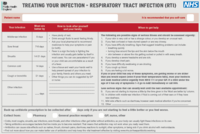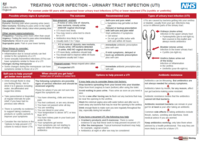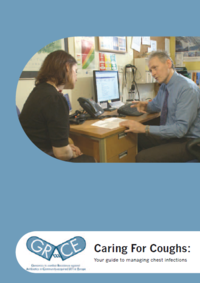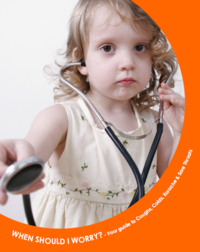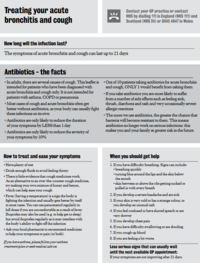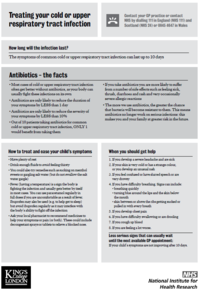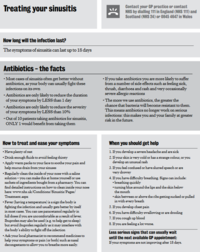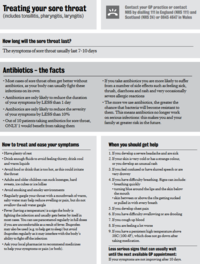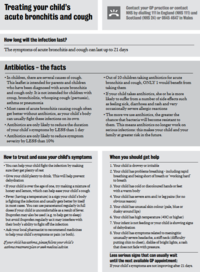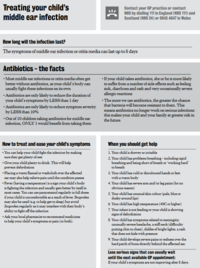Discussing a leaflet interactively in your consultations
Why use leaflets interactively in your consultations?
Using patient leaflets interactively in consultations is the best way to support effective discussions and maintain patient satisfaction.
Evidence from a Cochrane systematic review [20] and UK-based trials showed that using leaflets interactively with parents of children with respiratory tract infections [2], together with ehanced communication skills [1] and delayed prescriptions [14,21] helps to:
- Address patient/parent concerns: you can highlight information about symptoms and expected duration.
- Empower patients: you can provide specific examples of how to self-care for infections.
- Improve patient recall: patients are likely to better remember the consultation and your advice.
- Improve patient satisfaction and enablement: by covering information which addresses patient concerns
- Standardise advice: leaflets help deliver a more consistent approach to infection management in your practice.
- Support your advice: leaflets can provide objective evidence to support your explanations.
- Reduce antibiotic use: patients in trials who had consultations where leaflets were used interactively were prescribed and consumed fewer antibiotics.
'Treating Your Infection' leaflets (see below) are available in 24 languages and in a pictorial format (they can be downloaded from the RCGP TARGET toolkit website).
How to use leaflets interactively to engage patients?
- Introduce the leaflet early: patients may feel "fobbed off" if you just give them a leaflet at the end of the consultation without going through it. You can point to sections within a leaflet whilst you give your explanation about symptoms and management.
- Personalise the leaflet: you can add the patient's name and highlight sections which are relevant to them by filling in or circling sections.
- Provide options: you can give patients printed leaflets or send them by text message or email.
Below are examples of leaflets for patients with common infections - you can choose the leaflets to use with your patients. They all provide information on:
- Average symptom duration for common infections
- Self-care advice for patients/parents
- Safety-netting advice about when to reconsult
Example leaflets
The 'Treating Your Infections' (TYI) leaflets for respiratory tracts infections (RTI) and urinary tract infections (UTI) have been developed by Public Health England based on feedback from patients [22].
- They are available in 24 languages and in a pictorial format and can be downloaded from the TARGET Toolkit website.
- They be personalised and have a section for a back-up/delayed antibiotic prescription.
- They can be embedded into clinical systems - guidelines on how to do this are available on the TARGET toolkit website.
- The TARGET toolkit also includes other patient leaflets (e.g., for older adults with UTIs, Antibiotic Guardian leaflet), other settings (e.g., out-of-hours), and user guides.
'Treating Your Infection - Respiratory Tract Infection' (TYI-RTI) leaflet provides information on 5 common infections (otitis media, sore throat, sinusitis, cold, cough), including symptom duration, self-care advice, prevention advice, and advice on when to re-consult.
'Treating Your Infection - Urinary Tract Infection' (TYI-UTI) leaflet provides information for women with suspected UTIs, including information on types and signs and symptoms of UTIs, recommended care, options to prevent UTIs and information on antibiotic resistance.
‘Caring for Coughs’ is a booklet developed by researchers at the University of Southampton and other institutions as part of a large European trial [1]. It was evaluated in a randomised controlled trial which showed that prescribers who used enhanced communication skills and discussed the booklet in their consutations reduced their antibiotic prescribing.
It provides information about the management of acute cough in adults, including:
- Causes of cough
- Symptom duration
- Whether antibiotics will help
- Self-care advice
- Advice on when to re-consult
Printed copies of this booklet have been sent to your surgery as part of the STEP-UP research study.
'When Should I Worry?' booklet was developed by researchers at Cardiff University as part of a research trial [2]. It was evaluated in a randomised controlled trial, which showed that the use of the booklet resulted in a two-thirds reduction in antibiotic prescribing, and that parents receiving the booklet were less likely to report that they would consult in the future if their child had a similar illness.
Specific training about using this booklet in consultations is available from www.whenshouldiworry.com.
It provides information on:
- Symptom duration
- How to manage infections at home
- Why antibiotics will not help
- Advice on when to re-consult
Printed copies of this booklet have been sent to your surgery as part of the STEP-UP research study.



